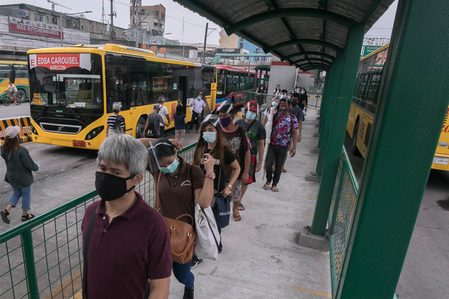SUMMARY
This is AI generated summarization, which may have errors. For context, always refer to the full article.

The Department of Health (DOH) said on Friday, January 8, that aside from the UK variant – believed to be more infectious than the old variant of SARS-CoV2 – it is also monitoring other variants of the virus found in South Africa and Malaysia.
In a virtual press briefing on Friday morning, Health Undersecretary Maria Rosario Vergeire said that the DOH will continue its surveillance after the Philippine Genome Center (PGC) did not find the presence of the COVID-19 variants in the 305 samples it tested.
“The initial 305 samples tested by the Philippine Genome Center were just initial. This is a continuing surveillance system that we have already established,” Vergeire said, adding that they have requested their regional units to provide them with samples that will undergo genome sequencing.
“We’re getting samples from the regions specifically in Mindanao and Visayas because we would like to see if mayroon tayong makita at ma-whole genome sequence natin to determine if may new variant tayo (there is a new variant in the country based on the genome sequencing),” she said.
Genomic sequencing is the process of analyzing the virus sample taken from a diagnosed patient and comparing it with other cases to see whether those who tested positive for COVID-19 have the new variant.
Mutations are normal
During the briefing, Vergeire explained that mutations in viruses are normal because they need to adapt to the environment.
The BBC reported that the virus that was first detected in Wuhan, China, is not the same variant detected in most corners of the world. To date, experts have detected 12,706 mutations of SARS-CoV2. Of these mutations, 398 variants of the novel coronavirus were found to have occurred repeatedly and independently.
Vergeire said that due to the continued surveillance, new variants are expected to be detected.
“The PGC continuously work with DOH Epidemiology Bureau to manage the surveillance of all these reported variants,” she told reporters in a Viber message.
What we know so far about the 3 variants
On Wednesday, December 6, the DOH confirmed that the 30-year-old female Hong Kong passenger who contracted the UK variant of COVID-19 is an overseas Filipino worker (OFW) from Cagayan Valley.
The DOH said on Friday that they have already identified the close contacts of the OFW. They are now in strict quarantine and their swab samples are undergoing genome sequencing. Results will be out by next week.
Despite the reported Filipino case in Hong Kong, the DOH maintained that the UK variant of COVID-19 is not yet in the Philippine shores, as shown by the results of the PGC‘s genome sequencing released on Wednesday. (READ: DOH, Genome Center: No new COVID-19 variant yet in PH)
It remains unknown how and where the Filipina domestic worker contracted the UK variant of COVID-19. (READ: DOH still can’t tell where, how Hong Kong passenger got UK COVID-19 variant)
The UK COVID-19 variant known as B117 was first detected in the United Kingdom in September 2020.
While there is no indication yet that B117 is more deadly, scientists have said that it leads to an increased viral load inside a person’s respiratory tract, so it spreads more easily when people talk or cough.
British researchers and public officials have said that B117 variant is more transmissible than other versions of the coronavirus, with estimates ranging from 50% to 70% more infectious than the old variant.
Meanwhile, Philippine health officials earlier said that the South African variant of the virus called 501Y.V2 has also not been detected in the country.
UK scientists expressed concerns on Monday that the vaccines being rolled out in Britain may be unable to protect against the South African variant because it “has a number additional mutations which are concerning.”
In December, Malaysian health officials found a new variant of the virus in their country dubbed A701B, but is still unknown whether this variant is more infectious.
The detection of the new variants has pushed countries, including the Philippines, to tighten borders anew as a precautionary measure. (READ: LIST: Countries facing Philippine travel ban due to new COVID-19 variant) – Rappler.com
Add a comment
How does this make you feel?






![[OPINION] Beyond infrastructure: Ensuring healthcare access for the poor](https://www.rappler.com/tachyon/2024/03/tl-healthcare-access-03402024.jpg?resize=257%2C257&crop_strategy=attention)
There are no comments yet. Add your comment to start the conversation.